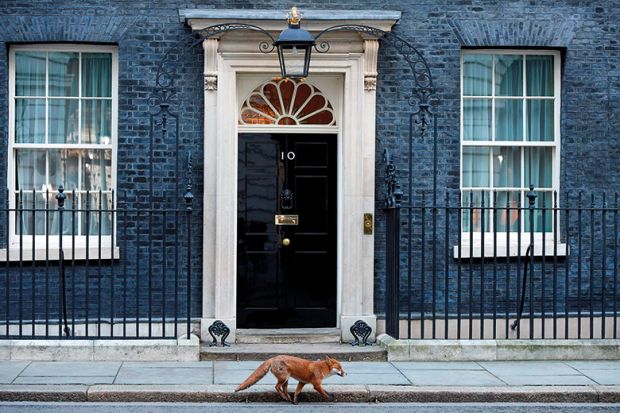The UK’s next prime minister must urgently address the “deep freeze” of university tuition fees and the loss of international scientific partnerships when they enter Downing Street, a former Tory higher education minister has warned.
While science and universities have featured fleetingly in the run-off to succeed Boris Johnson - now narrowed down to a choice for Tory members between foreign secretary Liz Truss and former chancellor Rishi Sunak - the country’s new leader will need to confront several long-standing challenges in these sectors as soon as they are elected in early September, said Lord Johnson of Marylebone, a universities minister under three prime ministers between 2015 and 2019.
Warning that the “higher education funding model needs to be put on a more sustainable footing”, the outgoing prime minister’s brother said that “indefinite tuition fee freezes in a high-inflation environment are going to stretch the unit of resource beyond breaking point”.
“The £9,250 fee was worth £7,965 in 2012 money in the last academic year and will be worth considerably less at the end of the planned further three years in the deep freeze,” continued Lord Johnson, who pointed out that fees had risen just once, in line with inflation, in the past decade.
“Now that it’s extended the term of the loan and lowered the repayment threshold, the government should legislate for an automatic inflationary uplift that doesn’t need annual parliamentary approval,” he added.
Those hoping that a future Tory government might ditch legislation on campus free speech following the departure from government of its architect, Michelle Donelan, are likely to be disappointed, he added. “Party leadership contests tend to drag candidates to the right,” said Lord Johnson, who noted it has “already been in the system a year, and in committee in the Lords, so reaching its final stages”.
The government would also not row back on “more concerning” legislation promised in the Queen’s Speech “which will enable the government to reimpose student number controls”, he added.
“The sector has been naive about student number controls – it won’t get the controls that some weaker institutions losing students want, but those the government wants,” he explained, adding that it would use them “first to go after institutions with poor [graduate outcome] metrics, but may ultimately see them as a tool to manage down the [student debt] in non-STEM subjects”.
The ongoing deadlock over the UK’s association to Horizon Europe, the European Union’s €90 billion (£77 billion) research initiative, was also unlikely to be resolved by a new leader given “all candidates are committed to the same approach to the Northern Ireland protocol”, he added.
“Being out of Horizon at the same time as fraught geopolitics is complicating our research relationship with China, the world’s largest spender on research, is doubly painful,” he said, adding that this situation will need “urgent attention if we're to remain a front-rank player in global science”.
On research spending, the election of Mr Sunak may also concern UK scientists given his reputation as being “pro-science but more fiscally cautious” than Boris Johnson, added Diana Beech, chief executive of London Higher and a former adviser to three universities ministers.
“When Johnson arrived in Downing Street, he had a huge mandate and both his brother, then science minister, and Dominic Cummings were in his ear talking about science – he could afford to make some big promises on research,” explained Dr Beech. “But times have changed – Sunak may see student numbers going up at Russell Group universities and think ‘they’re comfortable’,” she added, warning that this could persuade him to freeze fees again or claw back R&D investment.
Mr Sunak’s understanding of research may, however, hearten some. Giving the Mais lecture at City, University of London in February, the leadership front runner mentioned that “nearly half of our STEM researchers in this country are immigrants” and that the UK should have the “one of the world’s most attractive visa regimes… for highly skilled people”. He also spoke about improving on “one of most generous tax regimes for R&D investment anywhere in the world”.
But David Connell, a University of Cambridge economist whose research was cited by Mr Sunak in his lecture, said he was not impressed by the Treasury’s focus on R&D tax credits and the Patent Box, another tax incentive to encourage industry research, “together costing the taxpayer over £8 billion a year”.
“This is some 10 times the annual value of Innovate UK grants to UK businesses – these policies have been spectacular failures, with industry, if anything, spending less of its own money on R&D,” said Dr Connell.
The former venture capitalist blamed a “lack of proper oversight” by the Treasury under Mr Sunak for “preventing funding being reallocated to more cost-effective policies” and said a reset of innovation policy was needed.
后记
Print headline: New PM must fix fees ‘deep freeze’ and Horizon limbo




